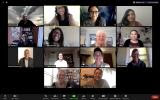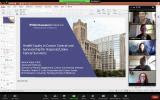 Graduate students from New Mexico State University and the University of Washington took part in an online crash course in research training after the COVID-19 pandemic cancelled many summer internship and training programs. Faculty and staff from several institutions presented throughout the workshop. (Photo courtesy of Destiny Olvera)At the end of each Spring Semester, students across the country start gearing up for summer research internships and experiences at institutions across the nation. But for many of these students, the COVID-19 pandemic resulted in the cancellation of these valuable summer programs.
Graduate students from New Mexico State University and the University of Washington took part in an online crash course in research training after the COVID-19 pandemic cancelled many summer internship and training programs. Faculty and staff from several institutions presented throughout the workshop. (Photo courtesy of Destiny Olvera)At the end of each Spring Semester, students across the country start gearing up for summer research internships and experiences at institutions across the nation. But for many of these students, the COVID-19 pandemic resulted in the cancellation of these valuable summer programs.
In an effort to continue student research training while many universities have closed their doors, a group of professors and scientists from New Mexico State University and the Fred Hutchinson Cancer Research Center joined forces to create a new virtual training program for graduate students, the Public Health and Cancer Research Workshop (PHCRW).
 Betina Yanez, an associate professor at Northwestern University, was one of more than a dozen presenters in the Public Health and Cancer Research Workshop, a virtual research training program for graduate students. (Photo courtesy of Destiny Olvera)Over the course of eight days in late June and early July, eight graduate students from NMSU and the University of Washington (UW) got a crash course in basic research skills and professional development.
Betina Yanez, an associate professor at Northwestern University, was one of more than a dozen presenters in the Public Health and Cancer Research Workshop, a virtual research training program for graduate students. (Photo courtesy of Destiny Olvera)Over the course of eight days in late June and early July, eight graduate students from NMSU and the University of Washington (UW) got a crash course in basic research skills and professional development.
“Learning can’t stop, because a lot of things have,” said Ernesto Moralez, an assistant professor in the Department of Public Health Sciences at NMSU and the lead facilitator of the PHCRW. “This can be a teachable moment.”
The workshop was sponsored by the Partnership for the Advancement of Cancer Research (PACR), a collaboration between NMSU and Fred Hutch funded by the National Cancer Institute, and featured presentations and exercises facilitated by professors and researchers at NMSU, Fred Hutch, UW, Northwestern University, and the University of Colorado Denver.
The topics included an overview of cancer and public health research from current project investigators, research design, quantitative research methods, scientific writing, and preparing for job interviews. Additionally, students learned about the impact of COVID-19 on cancer research and treatment, health disparities and public health systems.
As many educators and students have learned through this pandemic, Moralez said that moving to a virtual format presented a unique set of challenges including organizing rotating stations, facilitating interactive presentations, teaching statistical software, and maintaining a constant level of interest for the students.
For some of the students, the workshop presented a challenge in needing to be “always on.”
“’Zoom fatigue’ should be added to the dictionary, it’s a real thing,” said Ronald Dickerson, a graduate student in the NMSU Department of Public Health Sciences. “It was a new experience for all of us and it was one of my first experiences learning virtually. Sometimes I had WiFi outages, camera issues, just a lot of things I had to get accustomed to.”
Beti Thompson, a professor emeritus in the Public Health Sciences Division at Fred Hutch and one of the workshop organizers and presenters, said these challenges made her a little uneasy in the weeks leading to the workshop.
“I was really worried that it would be deadly dull… or that the students wouldn’t interact and there would be a lot of dead space and silence,” said Thompson. “But that wasn’t the case. Both of my challenges and worries were overcome by this mechanism and the various people we had participating. I just see it as being a win-win situation for everybody.”
Despite the challenges and nuances of teaching hands-on material in a virtual format, students and facilitators agreed that the workshop was a success and even removed some of the usual challenges of in-person activities.
“Instead of posing a new barrier to me, [the workshop] broke down one of my key learning barriers,” said Alana Lopez, a graduate student in the UW Department of Global Health. “I don’t feel like I learn really well in big groups and so I felt like I got so much out of this just because it was such a small group.
“I think that being online sort of changed the power dynamic between student and presenter, in a way that I have not really experienced face-to-face. I think there is a clear divide when you’re in person… and I felt like the virtual space created more opportunities and made it more comfortable to ask questions and interact.”
Dickerson added that the virtual format of the workshop provided a valuable opportunity to meet students and researchers from different institutions with diverse backgrounds and enabled the group to have a broader perspective in discussions.
Looking to the future, Moralez said the success of the workshop is a clear indication that virtual learning can and should be integrated into curriculum more.
“Why have we limited ourselves to only presenting in person?” said Moralez. “If someone wrote a paper or has a research agenda that applies in a class, why not invite them to jump on Zoom during class?
“I don’t know why we haven’t been doing this more in academia. This is what we should have been doing. It’s unlimited.”


